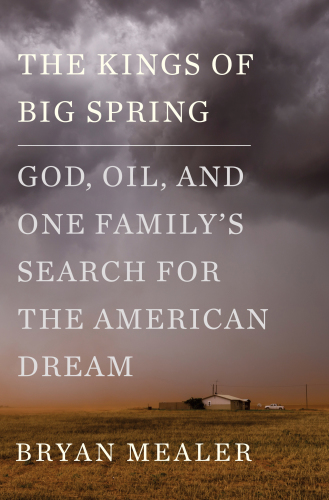
The Kings of Big Spring
God, Oil, and One Family's Search for the American Dream
کتاب های مرتبط
- اطلاعات
- نقد و بررسی
- دیدگاه کاربران
نقد و بررسی

Starred review from October 30, 2017
In this excellent family history, journalist Mealer (The Boy Who Harnessed the Wind) follows his Scotch-Irish forebears from the hills of northern Georgia to a distant frontier of rugged beauty, untapped resources, and devastating hardship. The saga plays out against the vast backdrop of West Texas from the 1890s through the author’s youth in the 1980s as one bonanza after another is erased by boll weevil, drought, addiction, or greed. Through all the dust storms and oil gushers, through bankruptcy and epidemics, generations of Mealers chase the American dream only to see it slip through their grasps, leaving them to find solace in Christian faith and one another. Mealer brings together his disparate materials with ease. The miniature cosmos of family life is counterpointed by profiles of national figures such as Bob Wills, the founder of Western Swing, and Raymond Tollett, a polymath ex–FBI agent who turned a bankrupt refinery into a regional powerhouse. Post-WWII prosperity made the hobo camps, child mortality, and crushing poverty of the dust bowl and Depression impossibly remote, yet Mealer’s narrative allows figures long frozen in black and white to walk again in living color.

A tale of boom and bust--but mostly bust--in the always-beckoning oil fields of Texas.In this epic, comparatively modest in size but ambitious in scope, Lone Star State native and itinerant correspondent Mealer (Muck City: Winning and Losing in Football's Forgotten Town, 2012, etc.) traces his family's checkered history across generations, planting cotton, fighting wars, grieving for the fallen, and always looking for better things. "Only in Texas was there enough space for so many second acts," he writes. Any reader of Larry McMurtry's Thalia cycle of novels will know just what Mealer means, and in the largest sense, his story is pretty familiar ground: People get desperate in the absence of money and careless in the presence of it. The author takes his time setting a textured backdrop for his story: Oil came late to Texas, but when it arrived, it did so with more than a vengeance. Edna Ferber might have modeled Giant on some of Mealer's characters, including a would-be baron whose sexual escapades got him thrown out of a country club, to which he replied, "I'll build my own place." The story eventually settles on Mealer's father, who worked endlessly to make his own luck but almost always hit a bad streak when in the company of his best friend, a dashing, likable, yet unreliable fellow who was always on the make, selling one lease with one hand to buy another with the other, hiring staff without quite knowing what they could do, and buying planes and houses with money that wasn't quite his. It was the Texas boom-and-bust tale all over again, punctuated with fistfuls of speed and long lines of cocaine; as Mealer writes, sagely, "it was hard to stay focused on Jesus when you were busy drilling for oil." True enough: One minute Reagan is newly in office and you're flush, the next he's in trouble and you're broke, and maybe you'll see the ghost of Bob Wills on the way to the poorhouse--or the bank.A big, eminently readable story, deftly spun even if with few surprises.
COPYRIGHT(2018) Kirkus Reviews, ALL RIGHTS RESERVED. (Online Review)

Starred review from February 1, 2018
Mealer (Muck City) returns to his roots in this multigenerational family saga, which transcends genres of biography and genealogy to become a panoramic social history of 20th-century Texas. He avoids romanticizing or politicizing his hardscrabble ancestors. Most women ran households and raised families; most men farmed the arid land, drilled for oil, drove trucks, or sold used cars. They eked out precarious existences among dust storms, oil booms and busts, revival meetings, and domestic tumult. But they also showed passion, tenacity, and loyalty--enough to revitalize the family saga genre, though late comedian George Carlin's quip about needing to be asleep to believe in the American Dream rings true for most of this book. In his themes and vivid storytelling, Mealer invites comparison to James Mitchener (Texas) or J.D. Vance (Hillbilly Elegy). Entertainment doubles as social history of rural, white, working-class Texans from 1982 to 2011. The stories also resonate with contemporary preoccupations of rural whites' socioeconomic distress and cognitive dissonance, particularly on matters of faith and sexuality. VERDICT As tribute to the grit of the rural poor, as social history of dirt-and-oil Texas, and as rambunctious family saga, this work triumphs. [See "Editors' Spring Picks," p. 29.]--Michael Rodriguez, Univ. of Connecticut, Storrs
Copyright 2018 Library Journal, LLC Used with permission.

September 15, 2017
In 1981, Mealer's father, Bobby, was lured home with his family to Big Spring, TX, a town that had seen oil booms and busts and was now booming again. The friend who lured him is billed as a real-life J.R. Ewing, and Bobby was drawn into a gilt-edged lifestyle. But there was a dark side to all the good fortune. One of the publisher's big books of the season.
Copyright 2017 Library Journal, LLC Used with permission.

























دیدگاه کاربران